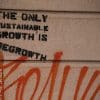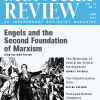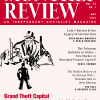
Planning Degrowth: The Necessity, History, and Challenges
Kent Klitgaard surveys degrowth thought, starting with the essential contradiction of capitalism presented by Marx, which gives rise to our current planetary crisis. Through an understanding this contradiction and degrowth literature spanning twentieth century, the author presents a plan for a sustainable and planned future socialist society. | more…

Capitalism, Global Poverty, and the Case for Democratic Socialism
The popular narrative that capitalism has led to a general improvement in human well-being over the last two hundred years is, historical data show, not supported by evidence. Jason Hickel and Dylan Sullivan enumerate the empirical and methodological problems on which this narrative is built and explore the potential benchmarks for truly understanding human welfare. | more…

Planning an Ecologically Sustainable and Democratic Economy: Challenges and Tasks
As the impending planetary crisis looms ever-closer, Martin Hart-Landsberg proposes a new focus on the Second World War industrial conversion experience, in which production and consumption were guided by central planning agencies. These successes and pitfalls of this period provide many useful lessons for activists and organizers working toward planned degrowth. | more…

Planning and the Ecosocialist Mode of Cooperation
Economic planning, Nicolas Graham writes, was not, perhaps a major theme in Capital. However, Marx’s understanding of such planning—as yet unrealized societal capability—yields great insight into how we might reorient modes of production toward cooperation and coordination. “Despite bourgeois and neoliberal ideology,” he writes, “planning is both an urgent necessity and a liberatory potentiality.” | more…

Democratic Planning for Degrowth
Degrowth promises to liberate society from the imperative of capital accumulation. “So how,” Matthas Schmelzer and Elena Hofferberth wonder, “might planning beyond growth look?” It is not, they write, only a proposal for a postcapitalist society, but for a radical transformation of our institutions and social relations to create a more sustainable and just world. | more…

Nine Theses on Ecosocialist Degrowth
In nine theses, Michael Löwy elaborates on the central themes of ecosocialist degrowth. “The ecological crisis,” he begins, “is already the most important social and political question of the twenty-first century.… The future of the planet, and thus of humanity, will be decided in the coming decades.” | more…

Degrowth—What’s in a Name? Assessing Degrowth’s Political Implications
“Degrowth” may often be associated with the left, but can also have conservative—even ecofascist—implications. What do proponents and critics mean by “degrowth”? How do these differences play out ideologically? Ying Chen writes that, for radicals, the answer is to place the economic system at the center of the degrowth narrative, thus naming the system that must be replaced with a more just and equitable socialist society. | more…

June 2023 (Volume 75, Number 2)
As the Pentagon gains approval for yet another record-breaking budget, the editors examine a perennial question: Why does the United States oligarchy need such an outsized military machine in the modern era? The answer is found in the current era of naked imperialism, accompanied, as always with deadly militarism. | more…

Engels and the Second Foundation of Marxism
Historical materialism, in the dominant twentieth-century narrative in the West, is understood as confined to social sciences and humanities. However, John Bellamy Foster writes, Marx and Engels did not have such a limited conception, instead engaging with the natural sciences, providing insight into the dialectics of nature. | more…

The Myth of 1968 Thought and the French Intelligentsia: Historical Commodity Fetishism and Ideological Rollback
In popular thought, the youth and student movements of France May 1968 have been linked with the thinkers of what is known as French theory. Gabriel Rockhill considers the actual, less-than-revolutionary actions of these popular philosophers in the student revolts, then turns our attention to a deeper question: Who benefits from drawing these tenuous connections? | more…

The Disinformation Wars: An Epistemological, Political, and Socio-Historical Interrogation
Helena Sheehan turns her incisive eye on the so-called anti-disinformation industry, and wondering whether the mainstream media is using a newfound interest in fact-checking, fake news, and disinformation studies to conceal deeper biases, ones that occlude the hidden ideologies deceiving much of the public. | more…

The Dynamics of Rural Capitalist Accumulation in Post-Land Reform Zimbabwe
Gregory Elich interviews George T. Mudimu, a Zimbabwe-based agrarian specialist, about present-day land struggles in Zimbabwe, two decades after the institution of the Fast Track Land Reform Program. | more…

May 2023 (Volume 75, Number 1)
This month, MR editors examine elements of the New Cold War rarely discussed in the mainstream media: the U.S. sabotage of the Nord Stream pipeline, which ensured Europe’s continued reliance on U.S. natural gas, and U.S. plans to transport B61-12 nuclear warheads to locations within striking distance of Russian targets. | more…